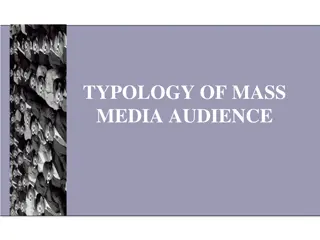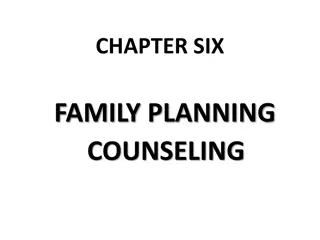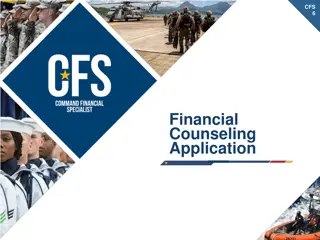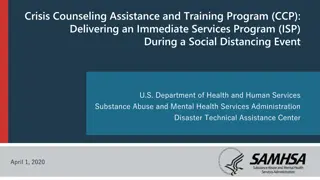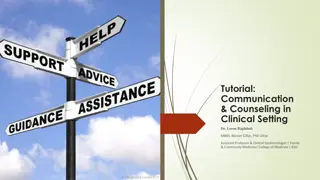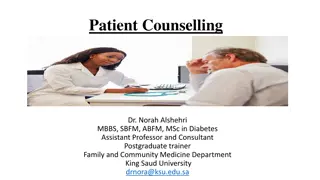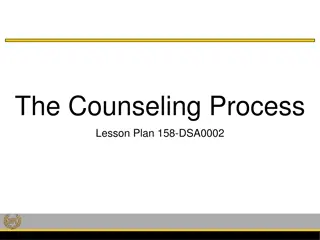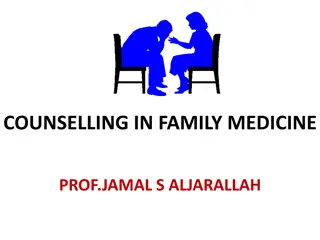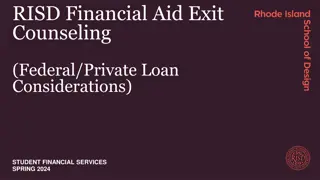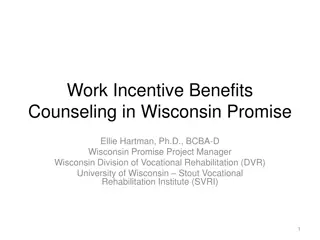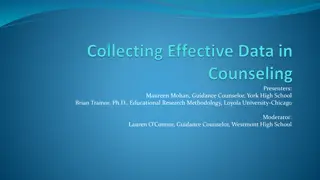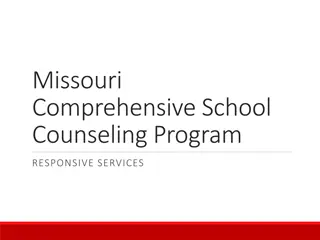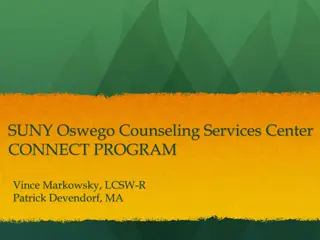Understanding Clientele and Audiences in Counseling
This presentation focuses on the diverse clientele and audiences in counseling, covering individual cases like children from broken families, persons with various struggles, and groups such as senior citizens, victims of abuse, and more. It explores work areas for counselors, including hospitals and detoxification centers, highlighting the importance of tailored support in addressing psychological and behavioral issues.
Download Presentation

Please find below an Image/Link to download the presentation.
The content on the website is provided AS IS for your information and personal use only. It may not be sold, licensed, or shared on other websites without obtaining consent from the author. Download presentation by click this link. If you encounter any issues during the download, it is possible that the publisher has removed the file from their server.
E N D
Presentation Transcript
LEARNING OUTCOMES LEARNING OUTCOMES The learners are expected to: Demonstrate a high level of understanding of the clientele and audiences in counseling; Identify specific work areas in which counselors work; and Describe the clientele and audience of counseling
A. INDIVIDUALS A. INDIVIDUALS 1. Child coming from a broken family 2. Child having sibling conflict 3. Drug abuse 4. Employee with work-related concerns 5. Person suffering from depression 6. Person with sexual disorientation 7. Person having difficulty in managing grief and bereavement 8. Person who is into a rocky relationship 9. Person who was a victim of sexual abuse 10.Person experiencing spiritual dilemma 11. Person suffering from stress and distress 12.Teenager having identity crisis 13.Person suffering from extreme anxiety or fear
B. GROUPS AND ORGANIZATIONS B. GROUPS AND ORGANIZATIONS SENIOR CITIZENS/PWDS SINGLES TEENAGE PARENTS VICTIMS OF RAPE FAMILY WHO LOST A LOVED ONE BATTERED WIVES/HUSBANDS LGBT GROUPS LABOR UNIONS STUDENT ORGANIZATIONS OFWS VICTIMS OF HUMAN RIGHTS ABUSE OUT OF SCHOOL YOUTHS STREET CHILDREN
1. HOSPITALS 1. HOSPITALS From assuming the role of a family grief counselor to providing mental health evaluations, counseling professionals with a bachelor's or master's degree often find employment at a hospital. Some counselors are hired to assist patients overcome various psychological and behavioral issues, while others may specifically focus on the rehabilitation of a hospital patient. With a Ph.D., Counselors can assume the position of clinical supervisor at a hospital, as well as qualify for many other jobs in administration.
2. INPATIENT OR OUTPATIENT DETOXIFICATION CENTERS There are only a handful of residential (inpatient) drug addiction rehab centers in the Philippines that provide affordable but world-class accommodations and evidence-based treatment programs. KAYA rehab is privileged to be in Baguio City, the Philippines's summer capital. Baguio s natural charm is irresistible with a nice cool climate, lush greens, pine trees, and friendly people.
2. INPATIENT OR OUTPATIENT DETOXIFICATION CENTERS KAYA offers personalized addiction treatment programs utilizing our Unified Treatment Program, which is effective and evidence-based use of Cognitive Behavioral Therapy (CBT), Facilitation of Twelve Steps, and Schema Therapy. KAYA caters to different types of addiction like substance abuse (drug rehab), alcoholism (alcohol rehab), problem gambling (gambling addiction rehab), food, Internet and sex. There are only a handful of residential (inpatient) drug addiction rehab centers in the Philippines that provide affordable but world-class accommodations and evidence-based treatment programs. KAYA rehab is privileged to be in Baguio City, the Philippines's summer capital. Baguio s natural charm is irresistible with a nice cool climate, lush greens, pine trees, and friendly people.
2. INPATIENT OR OUTPATIENT DETOXIFICATION CENTERS Counselors are hired to work in: Inpatient facilities hire counselors to assist with 24-hour care of high-risk patients battling substance abuse. Outpatient facilities hire counselors to provide treatment during the day, while patients are allowed to return to their homes at night. Substance abuse or addiction counselors may also serve as detox specialists or crisis workers within a detoxification center.
3. MENTAL HEALTH FACILITIES & AGENCIES Providing one-on-one treatment or holding group therapy sessions, professionals with a graduate degree in counseling are often employed at a mental health facility oftentimes according to their specialty. For example, community counselors are hired at localized mental health agencies to assist a local population, interact with community leaders, and bridge the gap between support services found in surrounding areas.
3. MENTAL HEALTH FACILITIES & AGENCIES A master's degree in counseling can lead to employment as a social worker, mental health counselor, or case manager at a mental health agency or facility. A doctorate in counseling qualifies a professional to take a position as a coordinator or director of a mental health agency.
4. RESIDENTIAL CARE FACILITIES A residential care facility provides counseling services to people living in a temporary environment that requires continuous supervision. This may include facilities that house troubled or at-risk youths, autistic children, or people with mental or physical disabilities.
4. RESIDENTIAL CARE FACILITIES An associate's degree in counseling prepares graduates to work at a residential care facility as a substance abuse or addictions counselor, where they may hold one-on-one counseling sessions or lead group discussions with people suffering from a chemical dependency.
5. HALFWAY HOUSES Halfway houses, also known as transitional housing facilities and recovery houses, hire rehabilitation and substance abuse counselors to guide patients or residents in need of help transitioning back to a societal environment, their family, their community, and/or entering the workforce.
5. HALFWAY HOUSES Counselors may work in: Voluntary substance abuse halfway houses, which allow recovering addicts to transition from inpatient therapy to re-entering society by living in a structured environment during outpatient therapy. Court-mandated halfway houses, which provide structure and support under strict supervision to formerly incarcerated juveniles and adults re- entering society.
5. HALFWAY HOUSES Counselors may work in: Mental health-related halfway houses, where individuals receive mental health counseling in a residential setting, such as patients that require medical supervision or victims of domestic violence.
6. GERIATRIC-RELATED FACILITIES Counselors, especially geriatric counselors, are often employed by facilities, agencies and organizations that serve the elderly population, such as hospitals, assisted living communities, senior community centers, retirement homes, independent living communities, as well as long- and short-term care facilities.
7. MEDICAL HOSPITALS AND OUTPATIENT CLINICS FOR VETERANS According to the Department of Veterans Affairs (VA), there are more than 1,200 VA community-based outpatient clinics, VA hospitals, and VAvet centers in the United States. Counselors are hired to work with veterans, their spouses, and family to address issues, such as PTSD (post-traumatic stress disorder) and anger management. Usually, a master's degree is required for the majority of VAcounseling positions.
8. CORRECTIONAL FACILITIES AND/OR PRISONS From mental health counseling to substance abuse counseling, the prison system employs counselors to provide individual and group therapy for individuals who are jailed, or living in a correctional facility. Correctional counselors also help develop a plan of action to assist inmates achieve rehabilitation goals, and prepare them for transitioning back into society after being released from prison.
9. RETAIL BUSINESSES Assuming positions in the human resources or public relations departments of large retail organizations, counselors with as little as a bachelor's degree are hired in the retail sector. Job duties typically include improving company-customer relationships, as well as designing and conducting training programs.
10. THE EDUCATIONAL SYSTEM Primarily helping students to better navigate the stresses of growing up and successfully completing their studies, counselors play an important role at all levels of the school system, such as providing crisis intervention following traumatic or violent occurrences like the death of a teacher, a gun violence incident, or peer suicide. Although a master's degree is often preferred, some counselors with a bachelor's degree are able to assume positions at a school.
10. THE EDUCATIONAL SYSTEM Additional work opportunities for counselors with an interest in higher education include: Developing curricula for various certificate and degree programs Evaluating counseling programs Mentoring aspiring counselors Writing textbooks Pursuing original research
11. CAREER CENTERS The majority of graduates with a vocational or career counseling degree work in career centers associated with high schools, colleges, as well as state government agencies. A bachelor's degree in vocational counseling is acceptable for some places of employment, but a master's degree is typically preferred, especially for counselors applying for a position at a college and university career center. Outside of a career center, some counselors work as consultants that match candidates to corresponding employment opportunities.
12. REHABILITATION CENTERS & AGENCIES Graduates with a bachelor's or master's degree in counseling may assume a position with a rehabilitation agency on the state, private, and non-profit level. A professional with a doctorate in counseling qualifies to become a director of a rehab facility. Counselors also find work in other job settings that involve rehabilitation, such as colleges, elementary and secondary schools, prisons, and independent-living facilities.
13. NON-PROFIT OR SOCIAL SERVICE AGENCIES Providing an array of counseling services centered on mental health, rehabilitation, substance abuse, and other areas of social work, counselors with undergraduate and graduate degrees find work at non-profit or social service agencies. Job candidates with a Ph.D. are qualified to oversee family counseling services for such agencies, including the governmental division of Child and Family Services.
14. RELIGIOUS INSTITUTIONS Counselors who specialize in combining traditional mental health counseling with the Christian faith often work in private practice and/or religious work environments, such as a church. Professionals must obtain a certificate in Christian counseling before they are able to use the Bible and religious teachings to treat clients. This type of professional is also not limited to strictly working in a religious setting, and may assist anyone in need of counseling.
15. PUBLIC OR PRIVATE PRACTICE Those with a Ph.D. in counseling can become a licensed professional counselor that works in a public or private practice. Most often, this type of counselor concentrates on a particular area of specialization, such as mental health counseling, family and marriage counseling, or substance abuse counseling.
15. PUBLIC OR PRIVATE PRACTICE A bachelor's degree in counseling allows a graduate to assume the position of an administrative assistant or researcher that works under the direct supervision of a certified psychologist with his or her own practice or business.
FEATURE WRITING Feature writing tells the reader a story. It has a beginning (lead), middle and end. It uses quotes liberally and allows the reader to see the story through detailed description and vivid writing. An interesting or catchy title may also be added
FEATURE WRITING DIRECTION: Write a feature article using the image as the basis. Make sure that you provide a title for your article. Three to four paragraphs may be sufficient. Please write legibly.



